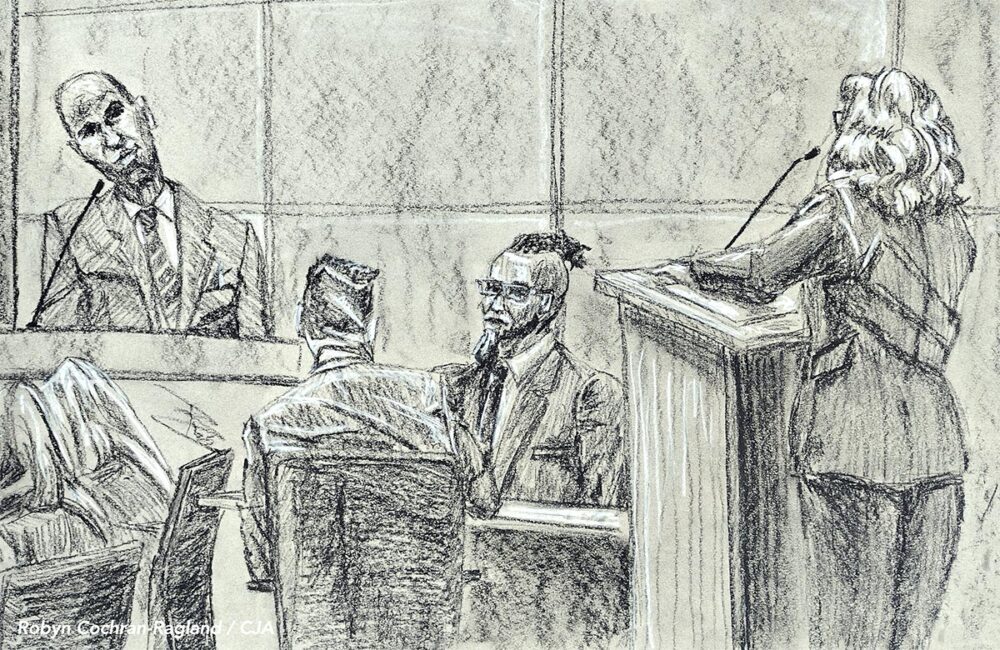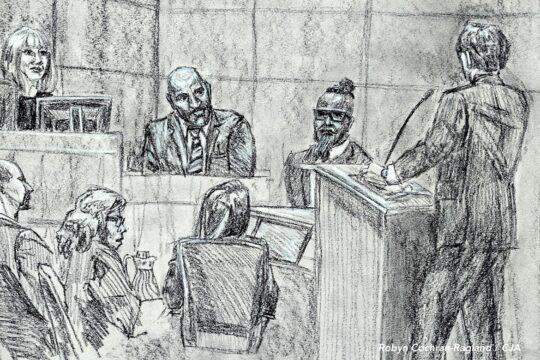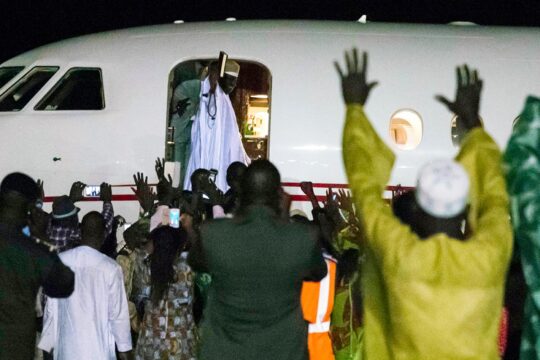In the trial of Gambian Michael Sang Correa in Denver, United States, the prosecution on Thursday April 10 started to play an audio recording of his interview with federal agents soon after his arrest and detention. In the audio, Correa confessed to being part of the Junglers – a hit-squad that operated under former Gambian president Yahya Jammeh – and taking part in arrests after the March 2006 failed coup.
“I am sorry… if I can reverse the situation… I am sorry. Did I take pleasure in it? It is unfortunate. Could I stop it if I had the power? Yes, I would have. Did I witness some of my colleagues torturing people? Yes. But I never took part. Did I kill people? Never,” said the defendant, who had a stammer, to US federal agents in September 2019.
Although his defence is now saying Correa was coerced and under duress when participating in the alleged acts of torture, in the audio recording he had denied participating in torture. He explained that his role was only to arrest the suspects and take them to the National Intelligence Agency (NIA). That was his only job, he emphasized.
Correa came to the United States in September 2016, to attend a United Nations General Assembly meeting as former Gambian Vice-President Isatou Njie Saidy’s bodyguard. The stamps on his passport shows that the defendant entered the United States with his diplomatic visa in both September and December 2016. Jammeh had lost the elections on December 1 and, according to Correa, friends called to inform him and advised him against returning to The Gambia.
“Yahya Jammeh lost. I was scared because I would go to jail for things I have not done. That is why I decided to stay around,” he claimed to the federal agents. In the ensuing years, the Gambia’s Truth, Reconciliation and Reparations Commission (TRRC) found Correa responsible for at least 11 killings.
How Correa was hunted down
Last Wednesday, on April 9, Special Agent Mathew Gifford of Homeland Security Investigations (HSI) testified before the Denver Court about how the United States was able to trace Correa, leading to his arrest in September 2019.
Gifford’s office is in Dakar, and Gambia is one of the countries under his “areas of responses”. He explained to the court that they knew Correa overstayed his visa in the United States, but they did not know where he was living. Knowing that he would likely send money home, Gifford explained that they traced him through Western Union.
Retired special agent Barton Garrison, who investigated and arrested him, testified on April 10, telling the court they also found out that Correa and his wife divorced and discovered that “the phone number his wife used on the divorce papers matched the number Correa used on Western Union.”
The US authorities continued monitoring him and eventually arrested him on September 17, 2019, outside his Colorado apartment. Garrison told the court that there was an order for the defendant’s deportation from the United States and he [Correa] was fighting that in court. The witness added that he was closely monitoring that case to see how it could affect their investigations. If Correa had been deported, the US would no longer have had the jurisdiction to indict and try him.
In the court proceedings on his immigration status, Correa said he did not run away from prosecution but he was on vacation to see his brother living in Tennessee who he had not seen for many years, and that he had plans to leave afterwards. “The government that came in [in Gambia] started to go after some of the others. That’s why I decided to stay.”
Refusing Jammeh’s orders
“Michael Correa was equally beating me. When his stick was short and he could not beat me anymore, he made these gestures to his comrades that they should beat me and that they should kill me. He was very aggressive. He was not in a compromising position,” said Pharing Sanyang, who is now retired from the army, in the Denver Court where Correa is on trial for torture.
On the day of the failed coup, Sanyang was arrested because he had an earlier meeting with Ndure Cham, the then Chief of Defence Staff who spearheaded the coup. The witness said he did not agree to the coup, and stated that he had already got clearance to meet the former chief of defence staff, so that it was not a secret meeting. Asked how he recognized the defendant, who he said wore a mask at the time he was torturing him, he responded that he could recognize him from his walking gait. “When he speaks, he stammers a bit,” he added.
“Were you ever asked to commit an act of violence in President Jammeh’s government?” the US prosecutor asked Sanyang.
“Yes, in 2006, to assassinate Deyda Hydara,” Sanyang replied, adding that he refused the order and suggested that if Hydara, a veteran journalist, did something wrong, he should be brought to trial.
“What happened when you refused President Jammeh’s orders?” inquired the US prosecutor.
Sanyang stated that the issue was brought to his attention again, but he refused, and he eventually made it onto the “assassination list”.
“You would not oppose him openly but if you did not feel safe, you could leave the country,” added Sanyang.
“If you are scared, you should leave the country. Is that what you said?” the prosecution asked.
“Yes, that is what I said.”
“And you left your family behind?”
“Yes.”
Escaping to Senegal
Several prosecution witnesses explained to the jury how when people feared for their lives in The Gambia, including those who did not want to follow orders from President Jammeh, they could flee to Senegal – where he could not harm them.
Lieutenant Colonel Sainey Bayo mentioned to the court the case of Major Kalipha Bajinka’s escape. Balinka was a soldier, now deceased, who was one-time State Guards Commander. He fell out of favour with the former president and fled The Gambia. Bayo himself was detained at the Mile 2 prison and taken to the NIA, where he was tortured. Although his statement was taken, he was not prosecuted, unlike other suspects.
Defence counsel Mathew Belcher put it to the witness that at least one brother of Major Bajinka were arrested following his escape. Bayo said he knew that he was released but did not know when.
The Absent Victim
One of the victims in the US trial, Pierre Mendy, was not present to face Correa in court. He is now deceased. Mendy was commander at the Fajara barracks. In his testimony before the TRRC, he said that he was told about the coup by a soldier, Alpha Bah, but did not take it seriously. This conversation eventually led to his torture, interrogation and imprisonment.
Following Mendy’s torture at the NIA, in which Correa is alleged to have taken part, witness Yahya Darboe told the Denver court that he would walk Mendy to the bathroom and observed injuries on him, adding that he appeared in so much pain.
During his testimony at the TRRC, Mendy described April 10, 2006, as the worst. “It was bright daylight. It was just like when a welder man is welding an iron, that is how it sparks.” He explained to the Commission that a plastic bag was melted on his head and that he was electrocuted four times.
“They dealt with me, and they left me. I saw Pierre being beaten,” Sainey Bayo explained to the Denver court. “He was handcuffed, hand behind the back. They poured water on his head, he put the head up. That was the time I knew that it was Pierre. And also, the screaming.”
Demba Dem was a member of parliament for former president Jammeh’s party. He was arrested at the National Assembly for his alleged involvement in the 2006 coup attempt. Dem eventually spent one year and three months at the Mile 2 prison.
He explained also to the US Court that he himself witnessed how Mendy was tortured and how Correa was present. During his interview with the federal agents, Correa himself admitted to seeing Mendy and Darboe being tortured.
The trial closed earlier than expected yesterday, on Monday April 14, before the Denver court, as the defence has called no witness and the defendant decided not to testify. The jury is now deliberating and is likely to deliver its verdict shortly.






